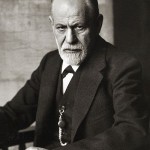What Does Lacan Say About… The End, And Ends, of a Psychoanalysis? (Part II)
For Part I click here The psychoanalyst as incarnation of object a The shift from Seminar X Around the time of Seminar X in 1963 there is a big shift…
What Does Lacan Say About… The End, and Ends, of a Psychoanalysis? (Part I)
Introductory Remarks The first question we have to confront is a terminological one: in what sense do we mean the 'end of a psychoanalysis'? This phrase could refer simply to…
What Does Lacan Say About… Acting Out?
We might begin by asking how it is that 'acting out' has come to be given the status of a concept in psychoanalysis? This is a valid question to start…
What is Psychoanalysis?
How would you answer the question 'What is psychoanalysis?' For anyone interested in psychoanalysis, having to explain concisely what psychoanalysis is and what it involves can elicit more than a…
The Case of Sigmund Freud
This documentary was first broadcast on BBC Radio 4 in the autumn of 2000 to mark the centenary of Freud's Interpretation of Dreams. As Freud scholars often remind us, this…
Reading… Seminar II, Chapter XIII – The Dream of Irma’s Injection
Seminar II - The Ego in Freud’s Theory and in the Technique of Psychoanalysis 1954 – 1955 Chapter XIII – The Dream of Irma's Injection (All quotations refer to The Seminar of…
Reading ‘The Unconscious’
The Unconscious 1915 Standard Edition Volume XIV Before going into depth on this important paper we can note the fact that at the very outset Freud differentiates between two different…
Reading ‘On the Universal Tendency to Debasement in the Sphere of Love
On the Universal Tendency to Debasement in the Sphere of Love (Contributions to the Psychology of Love II) 1912 Standard Edition Volume XI Despite the huge volume of psychoanalytic work…
Reading ‘Further Remarks on the Neuro-Psychoses of Defence’
Further Remarks on the Neuro-Psychoses of Defence 1896 Standard Edition Volume III The central thesis of the 1894 paper The Neuro-Psychoses of Defence restated: that it is possible to distinguish mechanisms…
Reading ‘The Neuro-Psychoses of Defence’
The Neuro-Psychoses of Defence 1894 Standard Edition Volume III Freud's point of departure in this paper is the contemporary agreement between he, Breuer and Janet, on the idea that in…



